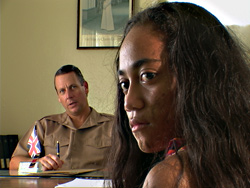The most improbably melodramatic, Hollywood-formulaic parts of the first Oscar candidate—in fact, the first movie—from the greater Fiji area turn out to be based on the writer-director’s actual life. UW visiting professor Vilsoni Hereniko grew up on the remote, 9-mile-by-2-mile isle of Rotuma (population 2,500), 600 miles north of Fiji; and by hard work, he won the scholarship that got one child per year a future off the island.
Among the coming-of-age episodes in his debut film, he says his family really was shamed when his father was accused of stealing a neighbor’s coconut—then later fined after a trial before a British judge unaware that the court translator was a corrupt crony of the accuser. Hereniko’s dad really did mysteriously and abruptly die, apparently from tuberculosis exacerbated by the remarkably poor local hospital. And the future filmmaker did run away from home at 14, angry and traumatized by the experience. His movie is 80 percent autobiographical.
But instead of fictionalizing his own remarkable life story, he creates a female doppelgänger, Viki (Sapeta Taito), to render such experiences. Like most of his cast, Taito was a Rotuman who had never seen a movie; her first visit to a theater was at the film’s triumphant 2004 world premiere at Sundance. She’s no actress, but her large, dark, protuberant, hooded eyes are marvelously arresting. The rest of the islanders, from the wicked accuser and the mistranslator to Viki’s family and fellow villagers, ham it up while dramatizing their actual folkways. The only professionals are James Davenport (who’s acted at ACT and the Rep) as the judge and Rena Owen (Once Were Warriors) as the mythical founder of Rotuma.
The film is weak in conventional narrative and production values. What do you expect of a 14-person crew fed by three cows brought over by boat to an island with intermittent electricity and no place to sleep or eat except with hospitable villagers? Yet that very authenticity is what gives Land its power. Hereniko captures the everyday texture of Polynesian life: the clan connections that make nobody want to rock the boat (so like Garrison Keillor’s Lake Wobegon newspaper, whose motto is “We Have to Live Here, Too”), the tension between pagan and Christian beliefs, the power of ancient stories and rituals.
Hereniko will introduce all four screenings both Saturday and Sunday (showtimes on p. 83), and he’s great at explaining the subtexts—such as the way the old-lady clown at the village feast ritually humiliates the chiefs, in a role reversal reminding everyone of the power of women. Land reminds us of the power of film to take us to another world.








